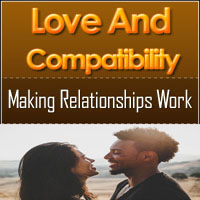


Unraveling The Magic Of Romantic Chemistry

Love, in all its forms, is a complex and beautiful phenomenon. At the heart of romantic love lies a fascinating concept known as "romantic chemistry." This elusive and powerful force is the mysterious spark that ignites a deep connection between two individuals. Understanding romantic chemistry offers insight into the electric, magnetic attraction that can lead to passionate love stories and lasting relationships.
Defining Romantic Chemistry
Romantic chemistry is the intense and often unexplainable connection that draws two people together in a romantic and passionate way. It is the magnetic force that makes your heart race and your mind swirl with excitement when you're with that special someone. This phenomenon often defies logic and explanation.
The Physical And Emotional Components
Romantic chemistry has both physical and emotional components. Physically, it can manifest as increased heart rate, sweaty palms, and a rush of adrenaline when you're near the object of your affection. Emotionally, it's the feeling of being understood, accepted, and deeply connected to someone in a way that transcends words.
The Role Of Attraction
Attraction is a key component of romantic chemistry. This attraction can be physical, emotional, or intellectual. Physical attraction often involves being drawn to someone's appearance, while emotional and intellectual attraction may involve shared values, interests, or a deep sense of understanding.
Shared Vibes And Connection
Romantic chemistry often involves a sense of shared vibes and connection. It's that feeling that you "click" with someone, that you understand each other on a profound level. It's a sense of being in sync with the other person's thoughts, emotions, and desires.
Spontaneous And Unpredictable
One of the unique aspects of romantic chemistry is its spontaneity and unpredictability. It can strike when you least expect it and with someone you might not have initially considered. The mysterious nature of romantic chemistry is what makes it so captivating.
Nurturing Romantic Chemistry
While romantic chemistry can be spontaneous, it's also possible to nurture and enhance it. Spending quality time together, engaging in activities that you both enjoy, and deepening your emotional connection can all help kindle the flame of romantic chemistry.
The Power Of Communication
Effective communication is essential in exploring and sustaining romantic chemistry. Sharing your thoughts, feelings, and desires with your partner is the key to understanding and being understood. It's through open and honest conversations that you can nurture and strengthen your romantic connection.
The Magic Of Long-Lasting Love
Romantic chemistry can be the initial spark that ignites a romantic relationship, but it's also the foundation on which long-lasting love can be built. As the excitement of the initial spark settles into a deep and enduring flame, the shared connection and intimacy grow stronger.
Romantic chemistry is a mysterious, exhilarating, and deeply human experience. It's the spark that sets the stage for passionate love stories and lasting relationships. While it may be elusive and unpredictable, it's a force that has the power to bring two individuals together in a way that defies logic and explanation, making it one of the most captivating aspects of human relationships.




Navigating Love Beyond Boundaries
 Age-gap partnerships, where there is a substantial difference in age between romantic partners, have long been a source of fascination, debate, and even controversy. These relationships challenge societal norms and traditional expectations, sparking complex discussions on issues such as power dynamics, societal judgments, and legal concerns. While age-gap partnerships can be filled with love and genuine connections, they often face controversy and scrutiny that can be challenging to navigate.
Age-gap partnerships, where there is a substantial difference in age between romantic partners, have long been a source of fascination, debate, and even controversy. These relationships challenge societal norms and traditional expectations, sparking complex discussions on issues such as power dynamics, societal judgments, and legal concerns. While age-gap partnerships can be filled with love and genuine connections, they often face controversy and scrutiny that can be challenging to navigate.
One of the primary controversies surrounding age-gap partnerships is the potential for power imbalances. In these relationships, the partner with more life experience and years often holds more sway, creating concerns about control and influence. It's essential for both partners to communicate openly and establish a relationship founded on mutual respect, trust, and consent. Addressing these imbalances requires a delicate and ongoing process of negotiation.
Society's perceptions and judgments play a significant role in the controversies surrounding age-gap partnerships.
The Power Of Rekindling Romance And Finding A New Beginning
 Love again requires us to embrace vulnerability. This means allowing yourself to open up to the possibility of being hurt once more. Vulnerability is not a sign of weakness but rather an indication of your courage to be authentic and open in your connections. It's about letting down your guard and allowing someone new into your heart, even when it feels scary.
Love again requires us to embrace vulnerability. This means allowing yourself to open up to the possibility of being hurt once more. Vulnerability is not a sign of weakness but rather an indication of your courage to be authentic and open in your connections. It's about letting down your guard and allowing someone new into your heart, even when it feels scary.
Taking Things Slow
Love again often flourishes when we take things slow. Rushing into a new relationship might not allow you to process the past fully. Take the time to get to know someone on a deep level, understand their values, and let them know yours. Building a strong foundation takes time, but it's worth it in the end.
Learning From The Past
One of the most valuable aspects of learning to love again is the wisdom gained from past experiences. Reflect on the lessons your previous relationships taught you. Understand the red flags and make conscious choices to avoid repeating the same mistakes. Learning from the past is an essential step toward creating healthier and more fulfilling relationships in the future.
Support And Connection
Loving again can be made more comfortable by seeking support and connection. Friends, family, or even therapy can provide a safe space for you to express your feelings and gain insight. Connecting with others who have been through similar experiences can also provide a sense of camaraderie and shared understanding.
Embracing Change And Growth
 Letting Go Of The Past: Moving on often involves letting go of the past. This doesn't mean forgetting your history but rather releasing the emotional burdens that may hold you back. It's about forgiving, healing, and freeing your spirit to embrace the new.
Letting Go Of The Past: Moving on often involves letting go of the past. This doesn't mean forgetting your history but rather releasing the emotional burdens that may hold you back. It's about forgiving, healing, and freeing your spirit to embrace the new.
Setting New Goals: Moving on signifies a new beginning. It's a chance to set new goals and aspirations, to envision what you want to achieve in this next phase of your life. Defining your goals provides direction and purpose.
Embracing Uncertainty: Change often brings uncertainty, and that can be intimidating. However, learning to embrace uncertainty can lead to personal growth and a sense of adventure. It's an opportunity to explore the unknown and to be open to the possibilities it brings.
Self-Reflection: Moving on allows for self-reflection. It's an excellent time to take stock of your life, your values, and your priorities. Understand what truly matters to you, and use this insight to shape your future.
Positive Support System: Surround yourself with a positive support system. Friends, family, or mentors can provide encouragement and guidance as you navigate your path. Their presence can make the journey more manageable and less lonely.
Seeking Professional Help: Major life transitions can be challenging to navigate alone. If you find yourself struggling with moving on, consider seeking professional help, such as therapy or counseling. Professionals can provide the tools and guidance you need.
Resilience Building: Moving on is an opportunity to build resilience. It allows you to adapt to new circumstances, learn from your experiences, and become stronger in the face of adversity.






 Positive Childhood Experiences: The Nurturing Ground For Healthy Adult Relationships
Positive Childhood Experiences: The Nurturing Ground For Healthy Adult Relationships
Positive childhood experiences are akin to nurturing the soil in which healthy adult relationships grow. In such environments, children learn the importance of trust, empathy, and effective communication. These are the building blocks for forming meaningful and lasting emotional connections in adulthood.
Trust: A child who grows up in an environment where trust and reliability are the norm is more likely to trust others in adulthood. Trust forms the bedrock of any meaningful relationship.
Empathy: Childhood experiences that emphasize empathy and compassion help individuals develop a deep understanding of the emotions and needs of others. This skill is pivotal in building strong emotional connections.
Effective Communication: A nurturing childhood encourages open and honest communication. Children who grow up in such environments are better equipped to address issues and conflicts in their adult relationships, fostering better emotional connections.
Boundaries: Learning about personal boundaries early in life helps individuals establish and respect healthy boundaries in their adult relationships, finding the right balance between independence and intimacy.
Challenges Of Negative Childhood Experiences
Conversely, negative childhood experiences can leave a lasting impact on adult relationships. Trauma, neglect, or adverse family dynamics during childhood can hinder an individual's ability to form and maintain healthy connections in adulthood.
The Impact On Adult Relationships: A Closer Look
Attachment Styles: Childhood experiences significantly influence the development of attachment styles, which continue to affect adult relationships. Secure attachment styles, rooted in positive childhood experiences, generally lead to healthier relationships. Insecure attachment styles, often a result of negative experiences, can pose challenges in forming emotional connections.
Embracing Life's Exciting Moments
 Defining Thrilling Experiences
Defining Thrilling Experiences
Thrilling experiences can take many forms, from embarking on a daring adventure to trying something new, confronting a fear, or even savoring a simple, heart-pounding moment. What sets these experiences apart is the rush of excitement, the sense of being fully alive, and the feeling of pushing the boundaries of our comfort zones.
The Element Of Adventure
Adventure is often at the heart of thrilling experiences. Whether it's skydiving from dizzying heights, white-water rafting down tumultuous rivers, or exploring uncharted territories, the thrill of adventure lies in embracing the unknown. It's about stepping out of your comfort zone and into the realm of uncertainty, where the ordinary transforms into the extraordinary.
Overcoming Fears And Challenges
Thrilling experiences often require individuals to confront their fears and challenges head-on. This can include conquering a fear of heights, public speaking, or even social anxiety. The feeling of empowerment that comes from facing and surmounting these obstacles is an essential part of the thrill. It demonstrates our resilience and capacity for growth, reminding us of the strength within.